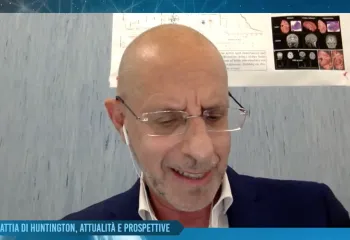
HD management model
"Unexpected Horizons - Construction of an organizational clinical management model of Huntington's disease", a very interesting document, is the result of the joint work of the Italian Enroll-HD Centers and the main patient organizations (LIRH Foundation and Huntington onlus), with the aim of outlining the current Huntington's disease scenario and, starting from there, to propose a health management model on the national territory that responds to the real needs of patients and their caregivers. Editorial coordination was entrusted to Edra spa with the unconditional contribution of Roche.
The analysis of the situation led to the identification of specific action priorities:
THE NEED FOR CLINICAL-INSTITUTIONAL COLLABORATION
Professionals wishing to take care of Huntington's should feel the urgency of dealing with critical issues and unmet needs regarding the management of patients throughout the country in a collaborative manner.
A MODEL BASED ON MULTIDISCIPLINARITY
The disease management requires above all a multidisciplinary approach for an optimal management of the patient that allows to cope with the neurological, genetic, cognitive-behavioral, psychiatric, rehabilitative and nutritional aspects of the disease.
THE ORGANIZATION IMPROVEMENT
The appropriateness of care cannot be separated from the enhancement of organizational aspects through a distribution, as uniform as possible, of assistance throughout the national territory, also through the connection with selected Centers recognized as more experienced or of excellence, able to guarantee professional skills and spaces dedicated to HD.
THE CREATION OF A NATIONAL NETWORK
A better connection and greater integration between clinical facilities (hospital and outpatient) and services across the country must also contribute to an adequate organization and provision of assistance, also understood as fair and rapid access to new therapies.
HOME CARE
Home care and interventions for Huntington's patients certainly represent a useful tool for achieving better clinical outcomes also through greater therapeutic adherence.
URGENT POLICIES TO BE IMPLEMENTED
Institutional interventions are necessary aimed at enhancing the role of Third Sector Entities on the national territory as well as political interventions that allow the recognition of the patient's frailty in all its phases, including the more subtle pre-symptomatic or initial one and the role of the caregiver with the implementation of appropriate actions to protect both figures.
SUPPORT FOR SCIENTIFIC RESEARCH
In order to improve the life outlook of patients with Huntington's, scientific research must be supported by adequate financial resources that enable results to be achieved that encourage and motivate patient participation in clinical trials.
THE HOMOGENEITY OF THE CARE PATHS
It is necessary to validate and implement uniform care pathways for patients with Huntington that are also based on the use of electronic databases and innovative technologies.
DIGITAL MEDICINE
Digital transformation in the healthcare sector must be able to foster an integrated and interdisciplinary management of HD and a patient-driven approach focused on the specific needs of patients who are placed at the center of a network of healthcare professionals and caregivers.
It is possible to review the video of the official presentation of the document HERE
Summarizing what emerged in this document and the contents of the White Paper on Huntington's disease, the key points for a correct management and treatment strategy for Huntington's are excellently summarized in the final slide presented by Prof. Luca Pani:







